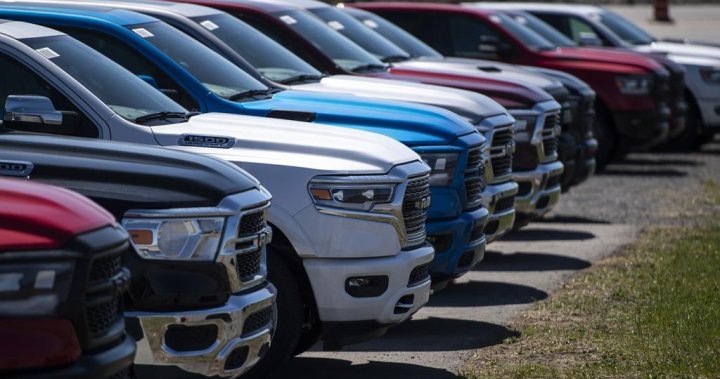Canada’s counter-tariffs on U.S.-made vehicles will come into force first thing Wednesday morning.
The move is the federal government’s response to U.S. President Donald Trump’s imposition last week of 25 per cent tariffs on vehicles made outside that country.
Finance Minister Francois-Philippe Champagne, who is also running for re-election as the Liberal candidate for Saint Maurice-Champlain, confirmed the counter-tariffs would come into force at 12:01 a.m. April 9.
“Canada continues to respond forcefully to all unwarranted and unreasonable tariffs imposed by the U.S. on Canadian products,” Champagne said in a news release.
“The government is fully committed to getting these U.S. tariffs removed as soon as possible, and will protect Canada’s workers, businesses, economy and industry.”
Trump had announced two weeks ago he would be imposing a 25 per cent tariff on all vehicles made outside the U.S. starting April 2, with all foreign-made cars and light trucks impacted, in addition to tariffs already placed on those goods.
In response to those tariffs, Prime Minister Mark Carney announced Canada’s own set of 25 per cent tariffs, though he did not specify at the time the date they would come into force —a date Champagne has now confirmed.
Carney had made the announcement during a pause from the campaign trail, where he is running as Liberal leader but retains caretaker responsibilities as the current prime minister.

Get daily National news
Get the day’s top news, political, economic, and current affairs headlines, delivered to your inbox once a day.
At the time, Carney said the team did not have the full details of Trump’s executive order that imposed the tariffs, so they would wait to determine how the tariffs would apply.
During the campaign, both Conservative Leader Pierre Poilievre and NDP Leader Jagmeet Singh have announced pledges to support auto workers amid the trade war.
Poilievre promised a $3-billion fund to loan money to businesses impacted by U.S. tariffs to keep workers employed through the dispute, while also axing the GST off the sale of new Canadian-made cars to boost their sales.
Singh has said his party would help the auto sector by boosting Employment Insurance and giving money collected from counter-tariffs to hard-hit workers. The party has also proposed waiving the GST on vehicles made in Canada.

Under the new counter-tariffs, fully-assembled vehicles that are not compliant with the Canada-U.S.-Mexico Agreement (CUSMA) and that are imported into Canada from the U.S. will face a 25 per cent tariff.
The same amount will also be imposed on non-Canadian and non-Mexican content of CUSMA-compliant fully-assembled vehicles imported from the U.S.
In addition to the tariffs, Carney had said a remission framework for auto manufacturers would be implemented to help incentivize production and investment in Canada, while maintaining Canadian jobs.
Details on the framework will be announced shortly, the Department of Finance said in a news release.
“Most importantly, every single dollar raised from these tariffs will go directly to support our auto workers,” it reads in the initial announcement from the Prime Minister’s Office on April 3.
The Department of Finance also released a full list of vehicle products that will be subject to the 25 per cent tariffs on its website.
The auto industry is already dealing with 25 per cent tariffs on both steel and aluminum, which are used in vehicle production. Canadian consumers and businesses also face the sweeping 25 per cent duties imposed by the U.S. at the start of March on all Canadian goods.
Canada was not included last week when Trump announced his global so-called “reciprocal tariffs.”
The White House has said if the sweeping 25 per cent tariffs on all Canadian goods end, then Canada will face a 12 per cent “reciprocal” tariff.
© 2025 Global News, a division of Corus Entertainment Inc.
Canada’s counter-tariffs on U.S.-made vehicles kick in April 9. What’s impacted?





